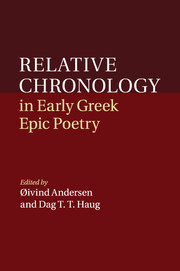Book contents
- Frontmatter
- Contents
- Notes on contributors
- Preface
- Abbreviations
- Introduction
- Chapter 1 πρῶτόν τε καὶ ὕστατον αἰὲν ἀείδειν
- Chapter 2 Relative chronology and an ‘Aeolic phase’ of epic
- Chapter 3 The other view
- Chapter 4 Late features in the speeches of the Iliad
- Chapter 5 Tmesis in the epic tradition
- Chapter 6 The Doloneia revisited
- Chapter 7 Odyssean stratigraphy
- Chapter 8 Older heroes and earlier poems
- Chapter 9 The Catalogue of Women within the Greek epic tradition
- Chapter 10 Intertextuality without text in early Greek epic
- Chapter 11 Perspectives on neoanalysis from the archaic hymns to Demeter
- Chapter 12 The relative chronology of the Homeric Catalogue of Ships and of the lists of heroes and cities within the Catalogue
- Chapter 13 Towards a chronology of early Greek epic
- Bibliography
- General index
- Index locorum
Chapter 11 - Perspectives on neoanalysis from the archaic hymns to Demeter
Published online by Cambridge University Press: 05 January 2012
- Frontmatter
- Contents
- Notes on contributors
- Preface
- Abbreviations
- Introduction
- Chapter 1 πρῶτόν τε καὶ ὕστατον αἰὲν ἀείδειν
- Chapter 2 Relative chronology and an ‘Aeolic phase’ of epic
- Chapter 3 The other view
- Chapter 4 Late features in the speeches of the Iliad
- Chapter 5 Tmesis in the epic tradition
- Chapter 6 The Doloneia revisited
- Chapter 7 Odyssean stratigraphy
- Chapter 8 Older heroes and earlier poems
- Chapter 9 The Catalogue of Women within the Greek epic tradition
- Chapter 10 Intertextuality without text in early Greek epic
- Chapter 11 Perspectives on neoanalysis from the archaic hymns to Demeter
- Chapter 12 The relative chronology of the Homeric Catalogue of Ships and of the lists of heroes and cities within the Catalogue
- Chapter 13 Towards a chronology of early Greek epic
- Bibliography
- General index
- Index locorum
Summary
Introduction
A fundamental, if vexed, contribution to a relative chronology of early Greek hexameter poetry is made by the consideration of literary relationships. Put at its most general, and most simplistic: if a literary work x can be shown to allude to a work y then y is older than x. Such an approach has played a key role in arguments for the priority of the Iliad to the Odyssey, of the Theogony to the Works and Days, of the Cyclic to the Homeric epics and, conversely, of the Homeric to the Cyclic epics. Here I offer some reflections, theoretical and practical, on such approaches.
The theoretical issues are familiar. The very notion of a literary history, of establishing a dependency between works, has an especially controversial application to early Greek hexameter poetry. There is even debate whether there are discrete works (‘fixed texts’) in this oral(-derived) tradition. The common stock of phrases, motifs and themes, moreover, makes it problematic to detect allusions in one work to another. Scholars nowadays are on the whole happier to assume that poets might exploit their audience's knowledge quite generally of the mythological tradition (‘mythological intertextuality’) or might manipulate the traditional uses of type-scenes or formulae (‘traditional referentiality’). Accordingly, rather than seeing early Greek hexameter poems as interacting with other specific poems, there is a preference for seeing them as ‘resonating’ with an abstract overarching tradition. In Saussurian terms, the preferred model of interaction is of parole with langue rather than parole with parole. Related to this preference is the ideological opposition between oralists’ ‘typical motifs’ and neoanalysts’ ‘transferred motifs’. Where neoanalysts are apt to identify one use of a motif in early epic poetry as ‘primary’ and another as ‘secondary’, inspired by the other, oralists would reject any direct dependence between the two, seeing each as independent manifestations of a traditional ‘typology’. Still more problematic, even for many who would accept transferred motifs, is the notion that individual phrases, or whole verses, may be transferred allusively from one specific poetic context to another. It is with these problems in mind that I offer the following perspectives on Homeric neoanalysis, a literary method committed to establishing relative chronological relationships between early Greek epics (as its alternative title, ‘the study of the history of motifs’, makes explicit). My investigation cannot avoid touching on related fundamental controversies: whether there can be sufficiently fixed ‘texts’ in this tradition to ground allusion and whether there can be ‘intertextuality’ (appropriately defined) within this tradition.
- Type
- Chapter
- Information
- Relative Chronology in Early Greek Epic Poetry , pp. 184 - 209Publisher: Cambridge University PressPrint publication year: 2011
- 1
- Cited by



